 |
So-called idiopathic scoliosis |  |
| SKOLIOZA / SCOLIOSIS | (2) Development of scoliosis |  POLISH VERSION POLISH VERSION |
Partner / książki / books: 
|
(2) Development of scoliosis Key sentences: Conditions/terms: Child. Growing. Asymmetry created through asymmetry of movement of hips. Asymmetry during gait and in "standing at ease" - in children with scoliosis only/or mostly on the right leg.
The asymmetry of movement of both hips: A/ leads to the asymmetry of load during gait, B/ leads to the asymmetry of growth of the child, C/ leads to the asymmetry of development of the pelvis and spine e.g. to the asymmetry of growth of vertebra body and processes (processi articularis),leads to scoliosis. Description of X-ray pictures of pelvis. Asymmetry of shape of pelvis, shifting in "symphysis of pubis", oblique position of os sacrum, wedge deformity of L-4, L-5. Here in bottom of spine (in pelvis) scoliosis begins to develop. This is confirmation of biomechanical influences of development of scoliosis and connection with "standing" and "gait"(!)
Additionaly explanation: the asymmetry of forces/loading" - it means - compression/overload in concave side of curve decreases growth - (in "Vicious Cycle") - leads "according to Wolff-Delpeche effect/law [the names quotes in Polish literature] - or Heuter-Volkmann effect [in English literature] - to the scoliosis "S" - I epg - double curves scoliosis - 3D deformity with stiffness of spine, with gibbous costalis, with progression, or leads to "C" scoliosis - II/A epg - lumbar (L or L-S, or L-Th) left convex or leads to "S" scoliosis - II/B epg - double deformity - but this "S" scoliosis is without stiffness of spine, without gibbous costalis and without progression (or very slight).
D/ Every type of scoliosis begins at the age of 2 - 3 - 4 years of life - when the child starts to be "active" and more walk and stand.
[description of the pictures of pelvis below] - mostly "Left sided Syndrome of Contracture" - see down - (Mau, Tylman, Gardner, Burwell, Stokes, Saji&Leong, Dangerfield&Coll., Willner, Wynne-Davies, Green&Griffin, McMaster, Magoun, Dega, Haikkila, Hensinger, Howorth, King, Dunn, Karski&Tarczynska&Frelek-Karska, Oleszczuk) and others. In "Syndrom of contractures" according to Prof. Hans Mau / Tubingen / Germany there are: a/ plagiocephaly, b/ torticollis muscularis, c/ contracture of adductors muscles in the left hip (later DDH), d/ tilt / asymmetry of the pelvis, e/ "infantile scoliosis" (only temporary deformity - it is not "so-called idiopathic scoliosis"), f/ "Haltungsschwache" [in German] (Mau) <=> "contracture of abductor muscles" (plus external rotation contracture, plus often flexion contracture), of ligaments and fascias in the frontal-lateral region of right hip (Karski 1995 - 2006 - 2007), g/ feet deformities, h/ bigger than normal "varus deformity of shank in newborns" - later - one of causes in "etiology of Blount Disease - T. M. Karski (2006) - see special LECTURES in this Web Site.
Pictures of pelvis: oblique position of pelvis as typical sign of "syndrome of contractures". This is caused by "adductor muscles and soft tissue shortening of left hip" and "abductor muscles and soft tissue shortening of right hip". Such X-ray picture in infants or small children suggests / orders "the examination of spine in age of 3-4-5 years" to search / to look for scoliosis (!).
[3] "The Syndrome of Contractures" in newborns and babies according to Professor Hans Mau [Tubingen / Germany] explains the asymmetry of morphology and also the functional asymmetry of the child's (newborns&babies) body.
See in German - "Siebener [Kontrakturen] Syndrom" - [more in "Skoliose in Deutsch" or in "Scoliosis in English" - or in "FOTOS / PHOTOS / WYKLADY / LECTURES" - next in subchapters "in green" with the word LECTURES (click on the link on the left)].
[4] "Left sided 'Syndrom of Contractures'" - in Poland concern 8 % of children (coming from Ist foetus position - 85% - 90% of all pregnacies - [Prof. Jan Oleszczuk - Gynaecologist, 1999, Lublin / Poland]). This "left sidet 'Syndrome of Contractures' explains - "The Geography of Deformities in Scoliosis" - left/right sides of curves & right side of gibbous costalis (Karski - 1995 -2004/2006).
Literature (English) - Karski, 1995-2006. On this Web Site - more in "Scoliosis in English" or in "Skoliose in Deutsch" but especially in "FOTOS / PHOTOS / WYKLADY / LECTURES" - and next many LECTURES (click on the link on the left). |
|||||||||||||||||||||||||||||||||||||||||||||||||||||||||||||||||||||||||||||||||||||||||||||||||||||||
| Data modyfikacji: 2014-12-06 | Strona przygotowana przez Prof. dr med. Tomasza Karskiego | |||
 |
 |





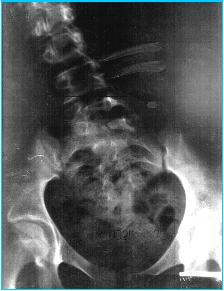
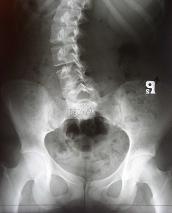 [1] Development of scoliosis and stages
of the spine deformity - influences on "course and character of deformity" (description of pictures below).
[1] Development of scoliosis and stages
of the spine deformity - influences on "course and character of deformity" (description of pictures below). 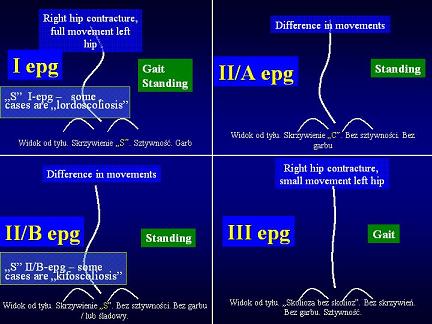
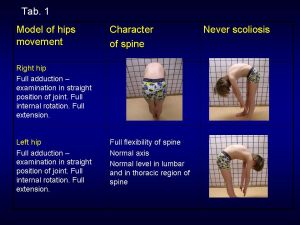
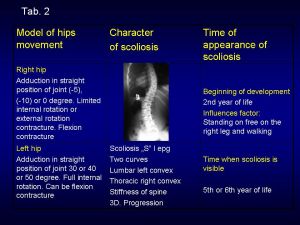
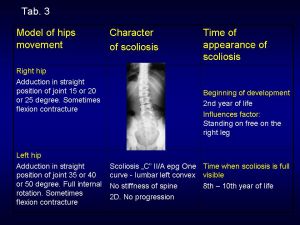
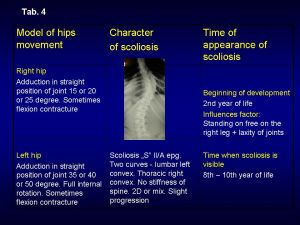
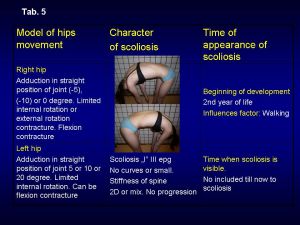
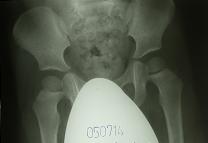
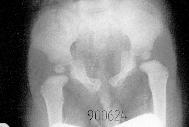 [2] The asymmetry is connected with "The Syndrom of Contractures" -
Prof. Hans Mau.
[2] The asymmetry is connected with "The Syndrom of Contractures" -
Prof. Hans Mau.